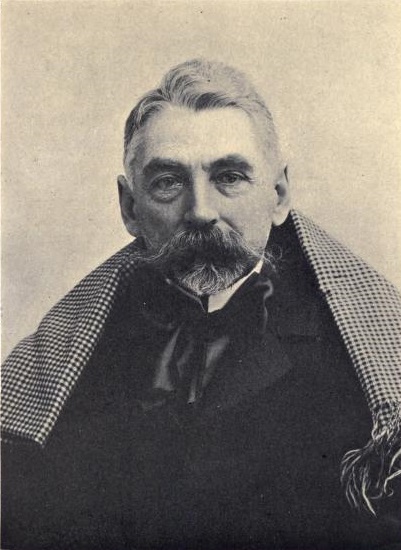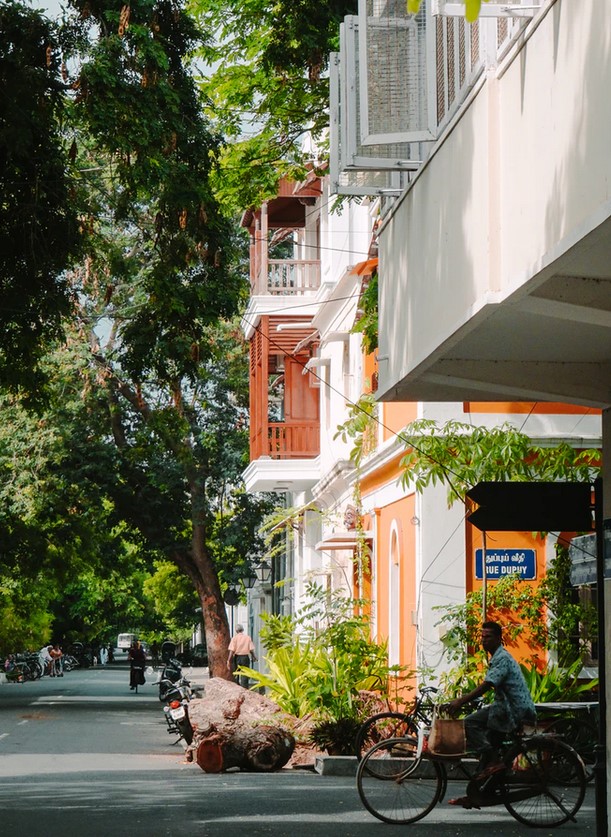In this last blog post before Christmas, we take a look at a festively themed quatrain written by the French poet Stéphane Mallarmé in 1896. One of a group of poems called ‘Dons de fruits glacés au Nouvel an’ [Gifts of glazed fruits at the New Year], these four lines commemorate the turning of the year in a single crystallised image:
Le temps
nous y succombons
Sans l’amitié pour revivre
Ne glace que ces bonbons
A son plumage de givre.
[Time
we succumb to it
Without friendship to relive
It glazes only these sweets
With its feathers of frost.]

A very brief bit of background about Mallarmé…
Stéphane [Étienne] Mallarmé was born in Paris in 1842 and died in 1898 in Valvins, near Fontainebleau. He is one of the most famous French poets of the second half of the nineteenth century and is often linked to the Symbolist movement, although Mallarmé himself resisted this categorisation to a degree. The Symbolists were broadly interested in pursuing the ‘Idée’ and adopted Mallarmé’s attempt to ‘peindre, non la chose, mais l’effet qu’elle produit’ [paint, not the thing itself, but the effect it produces]. They sometimes took an avant-garde approach to poetic form, and were amongst the earliest writers to experiment with vers libre and prose poetry. Mallarmé himself produced poetry in both verse and prose, as well as critical work and the long experimental poem Un Coup de Dés jamais n’abolira le hasard. His poetry is known for its syntactic playfulness and linguistic precision, each poem representing a challenge to the reader and opening up a space for potentially limitless interpretation. Blank space, nothingness, the void – these become the source of artistic creation as the poet sought to bring something out of nothing, striving to evoke no one flower but, rather, ‘l’absente de tous bouquets’ – the ideal flower that cannot be found in any real bouquet.
So what about the poem itself?
This quatrain is an example of what Mallarmé called ‘vers de circonstance’: circumstantial poems, written for a particular occasion or in response to stimuli he encountered in his everyday life. For instance, in addition to writing a number of poems around holiday times to mark the Christmas, New Year, and Easter periods, he wrote toasts to be given at special dinners, birthday poems for his friends, and even snippets of poetry to his correspondents when he sent them letters, the poems a playful way of representing the recipient’s address.
These vers de circonstance are often amusing but they can also gesture towards some of the more serious themes within Mallarmé’s wider work, a more lighthearted way for him to reflect on the deeper questions he had explored elsewhere. Let’s dive deeper into this example…
Close reading
The opening words of the poem reveal its central concern: time and the effect of time on personal relationships and on the writing process. We are told that ‘nous succombons‘ – we succumb – to time, thereby personifying it in an image that suggests oppression or temptation and yielding. Time is also the subject of the verb ‘glacer’ and the possessor of a ‘plumage de givre’: two icy images of an abstract temporal figure.
And yet, there is someone else also present in this poem: the speaker. And the speaker is not isolated and solitary, but speaks in the first person plural, ‘nous succombons’. Who is this ‘nous’? With whom is the speaker interacting? We don’t know exactly, but what we do know is that the poem accompanies a ‘don de fruits glacés au nouvel an’, a gift of glazed or candied fruits, or bonbons, to commemorate the new year. We might therefore assume a degree of friendship between the speaker and the addressee as they are close enough to exhange this gift. The bonbons are an illustration of intimacy and this is also true of the poem itself, where that ‘nous’ acts as a link binding two people, a textual representation of their friendship.
Speaking of friendship, that ‘sans amitié’ might feel out of place at first (this is one of the challenges of reading Mallarmé!). Who, we might ask, is friendless? We are tempted to assume it is the person most recently referred to in the line above – the speaker and his nameless addressee. But this does not make sense, because we know that the speaker and his addressee are exchanging a festive gift and that neither of them can therefore be thought friendless. The only other option is that time itself must be friendless. The personification of time, together with the icy imagery, suggests that time is a lonesome figure, which can only freeze the world around it, whereas the speaker and his addressee have the warmth of companionship.

But it’s not all solitude and misery because there’s an element of humour at work in this poem as well. Immediately, our eye is drawn to the split first line: by breaking the line in this place and indenting ‘nous succombons’, Mallarmé offers us a visual pun on the verb ‘succomber’ as the second half of the line submits to the first by continuing below it.
Moreover, the more oppressive tone of ‘succombons’ is offset by the fact that it rhymes with ‘bonbons’. The reference to sweets lightens the mood: we may be talking about submission but we are also talking about candy. Putting aside the possibility of some nightmarish Willy Wonka vision, the bonbons add a dose of characteristic Mallarméan playfulness to a serious reflection on our relationship to time. In this reading, time might appear less as an oppressor exerting pressure, and more as a temptation to which we might reluctantly give in – and it is difficult not to hear the echo of ‘temps’ in ‘tentation’.
Besides the succombons/bonbons pairing, there is another important rhyme in the poem: revivre/givre. ‘Givre’, meaning frost, is a reference to the sugar which coats the fruit offered in the poem. If we speak of ‘une orange givrée’, we mean a candied orange, with ‘givré’ in this sense a synonym for ‘glacé’. If you picture a slice of candied orange, it is easy to see how the sugar resembles frost. But this is no accidental allusion to frost, just as ‘glacer’ is no accidental allusion to ice: winter imagery is common in Mallarmé’s poetry and is a means for him to think about the creative process. In his earlier poetry, this is a way of figuring sterility, an anxiety about writing in the fin de siècle (the late nineteenth century) when Mallarmé would write in another poem, ‘Brise marine’: “La chair est triste, hélas! et j’ai lu tous les livres” [The Flesh is sad, alas! and I have read all the books]. Creativity has been exhausted and time, that icy figure, has rendered poetry infertile.
In this sense, the winter imagery of this quatrain is in dialogue with some of Mallarmé’s other, more extensive texts. We might think particularly of his text ‘Hérodiade’, a dramatic poem related to the story of Salomé, and which centres around a virgin princess who frets over her own purity. Sterility is a central theme in this text, and Hérodiade expresses this with reference to both coldness and her mirror: ” la froideur stérile du métal,/ […]/ Assez! Tiens devant moi ce miroir./ Ô miroir!/ Eau froide par l’ennui dans ton cadre gelée […]” [the sterile coldness of the metal,/ […]/ Enough! Hold this mirror before me./ O mirror! Cold water frozen by ennui in your frame […].].
This alignment of the mirror with coldness recalls the double meaning of ‘glace’ as both ice and mirror. Thus, when this new year’s quatrain refers to time’s ability to ‘glacer’ the bonbons, we might consider that time is not only glazing the fruit but is also mirroring it or rendering it double. Where might we look for the reflection or double of the fruit? Perhaps to the poem itself, which acts as the fruit’s double, a glazed offering of friendship as a riposte to temporal suspension.
Besides ‘Herodiade’, the other clear intertextual reference is to Mallarmé’s sonnet ‘Le vierge le vivace et le bel aujourd’hui’, which focuses on the image of a swan trapped on a frozen lake, unable to fly. Traditionally, swans have been a metaphor for poets, and the fact that Mallarmé’s swan is grounded indicates we are once again dealing with the question of poetic sterility. This poem alludes to many of the things mentioned in our New Year’s quatrain, evoking in particular “Ce lac dur oublié que hante sous le givre/ Le transparent glacier des vols qui n’ont pas fui!” [This hard, forgotten lake which is haunted beneath the ice/ By the transparent glacier of flights which have not taken off!] and also referring to the swan’s ‘plumage’. The fact that ‘plumage’ appears again in the New Year’s quatrain reinforces the suggestion that this quatrain was written with Mallarmé’s earlier sonnet in mind. In the quatrain, the word ‘plumage’ gestures towards the fronds of sugar on the candied fruit which may resemble feathers, but it also alludes to a ‘plume’, a feather or quill, and is therefore a nod to the act of writing. By reading this quatrain alongside Mallarmé’s other writing, we see the themes of sterility and writing come to light.
So it becomes clear that this is a poem about poetry: about what it means to write and the frustrations of the creative process, which can feel sterile or infertile. Nonetheless, while the Mallarmé of the 1860s, who wrote ‘Hérodiade’ and ‘Le vierge le vivace et le bel aujourd’hui’, was anxious about sterility, we should bear in mind that Mallarmé’s later poetry moved away from this preoccupation and towards a different way of understanding the bare white space of winter: as a blank canvas waiting for the writer and reader to bring it to life. The mirror’s surface, the icy lake, the blank page: these become a space of endless potentiality. The New Year’s quatrain, written in 1896, may be more reflective of this later Mallarmé than the early Mallarmé. This is why it is important that ‘givre’ rhymes with ‘revivre’: there is room here for renewal and creative hope. What’s more, the ghost rhyme latent in a poem such as this must surely be ‘livre’, another reference to writing. In this light, time may offer potential for renewal as opposed to a sterilising of creativity, and we might indeed read that ‘succomber’ as an indication of temptation rather than oppression.
This lighthearted quatrain, therefore, is more than simply a few trite lines composed on the occasion of sending a friend a gift of candied fruit. The poem itself is a present, an embodiment of friendship, and it is also a comment on the writing process. Permanence, the act of creation across the blank page, fin-de-siècle stasis and renewal: all are encompassed in this small text. Poetry thus becomes a way of submitting to, but also resisting, time. It is a new year’s gift to us, as readers, an offering of renewal.
We hope you enjoyed that reading of a festive quatrain in our last post before Christmas. We’ll be back on 8th January and all that remains to be said is Happy New Year – or bonne année!


